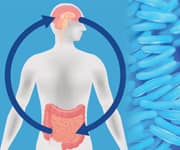Life Extension Magazine®

Probiotics are in the news, and you’re probably wondering if you should be taking one every day.
“I recommend a mixture of probiotic supplements and probiotic-rich foods to virtually all my clients,” says registered dietitian Natalie Rizzo, MS, RD.
Why does she think these types of supplements are so helpful?
It’s because there are trillions of live microorganisms called microbiota already living in your body. They are your microbiome, a term which refers to the whole ecology of your digestive tract, including the microorganisms.
A variety of species and strains in your microbiota affect multiple health conditions in positive ways. Probiotics can help augment and balance the microorganisms already living in your digestive tract.
In this interview with Life Extension® Natalie Rizzo, MS, RD, discusses the benefits of probiotics and how to choose one that is right for you.
LE: Probiotics are a relatively new field of study. Can you tell us about some areas of research regarding probiotics?
Rizzo: It’s quite exciting that probiotics and gut health are coming to the forefront. There is much published research that shows how digestive health is connected to immune health, mood, weight loss and more. When I tell clients about this, they seem quite surprised because probiotics are something that may just be appearing on their radar for the first time. Many people know the term “gut health” but don’t really know what probiotics do and how they can affect health. Once I explain that our bodies are filled with trillions of microorganisms, a whole new world opens for them.
What’s more, all people have a unique mix in the microbiota of their own gut.
LE: If these microorganisms live in the gut, how do they affect the immune system?

Rizzo: Other parts of the body also have their own unique microbiomes, like the vaginal canal, the mouth, and the skin, but most of our resident microorganisms live in our gut. That’s where you’ll also find 70% to 80% of the body’s immune cells.1 The makeup and activity of those immune cells is influenced by the makeup of microbes in your gut.
More specifically, research has found that probiotics may provide promising solutions to certain common illnesses. For instance, strep throat is caused by a group of bacteria known as type A streptococcus, which is responsible for up to about 15% of throat infections in adults and up to about 30% in children.2
Research has found that the probiotic strain S. salivarius K12 may have the potential to stop strep throat before it starts. S. salivarius K12 produces compounds called lantibiotics, which target the organisms that cause strep throat.3 One clinical study showed a reduction in strep throat infections in people who took a daily probiotic lozenge containing S. salivarius K12.4
Probiotics play quite an amazing protective role. They may even help combat seasonal allergies.
LE: Really? How do the microorganisms in the gut affect seasonal allergies?
Rizzo: An allergic reaction arises when the immune system overreacts to something in the environment, like dust or pollen. Many people reach for an antihistamine that provides temporary relief, but a more effective approach is to try and restore balance within the immune system.
A certain type of immune cells, called T helper type 2 cells (Th2), play a role in restoring balance to the immune system. Scientists have discovered that yeast fermentate, a form of baker’s yeast, and the probiotic strain Lactobacillus acidophilus L-92 help restore normal Th2 balance and reduce the immune system’s allergic responses.5
LE: Let’s circle back to what you said about some probiotics affecting mood. What does that mean and how does it play a role in health?

Rizzo: Depression and anxiety are widespread throughout the U.S., and they are usually viewed as disorders of the brain only. However, scientists have recently discovered that microorganisms living in the gut have an impact on the brain. In fact, this relationship between the biochemical functioning of the brain and probiotics in the gut has been dubbed the gut-brain axis.6 In other words, the gut can affect the brain and vice versa. Researchers have shown that two specific probiotics have a positive impact on mood. They are Lactobacillus helveticus strain R0052 and Bifidobacterium longum strain R0175.7
For example, a study of adults sought to determine how this probiotic combination may affect anxiety and depression. The participants were given 3 billion colony-forming units (CFUs, a measure of the number of individual organisms) of the probiotic combination, or a placebo, for 30 days, and the results were really promising. Those who took the probiotic combination experienced a 49% drop in the Global Severity Index, a measure of overall psychological distress, and a 50% decrease in depression scores.8
LE: That’s quite astounding. Are there any other roles for probiotics regarding health benefits?
Rizzo: Actually, our mouths are full of microbes, so probiotics play a huge role in oral health. If the bacteria in the mouth become unbalanced from poor diet and excessive consumption of sweets, disease, smoking, or drugs, it can cause microbial imbalances, resulting in cavities and gum disease. This can cause other health problems throughout the body.
But scientists have identified two strains of good bacteria that can combat poor oral health. First, L. plantarum L-137, a heat-treated strain of common Lactobacillus bacteria, prompts immune-boosting cells to begin a healing process in the mouth.9 Then, in conjunction with S. salivarius M18, it works to override and kill harmful bacteria that can cause cavities and gum disease.10 These strains are a great addition to your daily flossing and brushing routine.
LE: What should someone look for when choosing a probiotic?
Rizzo: Well, now that you know how different strains affect different conditions, I suggest looking for one that is right for you and your specific needs. There are a variety of targeted, condition-specific probiotics with strains for immune health, oral and nasal health, mood, and more. The science of probiotics is rapidly evolving into its own therapeutic category.
Natalie Rizzo, MS, RD is a NYC-based media Dietitian, food and nutrition writer, national spokesperson and owner of Nutrition á la Natalie, a successful sports nutrition blog.
If you have any questions on the scientific content of this article, please call a Life Extension® Wellness Specialist at 1-866-864-3027.
References
- Holmgren J, Czerkinsky C, Lycke N, et al. Mucosal immunity: implications for vaccine development. Immunobiology. 1992 Feb;184(2-3):157-79.
- Shulman ST, Bisno AL, Clegg HW, et al. Clinical practice guideline for the diagnosis and management of group A streptococcal pharyngitis: 2012 update by the Infectious Diseases Society of America. Clin Infect Dis. 2012 Nov 15;55 (10):e86-102.
- Hyink O, Wescombe PA, Upton M, et al. Salivaricin A2 and the novel lantibiotic salivaricin B are encoded at adjacent loci on a 190-kilobase transmissible megaplasmid in the oral probiotic strain Streptococcus salivarius K12. Appl Environ Microbiol. 2007 Feb;73(4):1107-13.
- Di Pierro F, Colombo M, Zanvit A, et al. Use of Streptococcus salivarius K12 in the prevention of streptococcal and viral pharyngotonsillitis in children. Drug Healthc Patient Saf. 2014;6:15-20.
- Ishida Y, Nakamura F, Kanzato H, et al. Effect of milk fermented with Lactobacillus acidophilus strain L-92 on symptoms of Japanese cedar pollen allergy: a randomized placebo-controlled trial. Biosci Biotechnol Biochem. 2005 Sep;69(9): 1652-60.
- Alonso C, Vicario M, Pigrau M, et al. Intestinal barrier function and the brain-gut axis. Adv Exp Med Biol. 2014;817:73-113.
- Messaoudi M, Violle N, Bisson JF, et al. Beneficial psychological effects of a probiotic formulation (Lactobacillus helveticus R0052 and Bifidobacterium longum R0175) in healthy human volunteers. Gut Microbes. 2011 Jul-Aug;2(4):256-61.
- Messaoudi M, Lalonde R, Violle N, et al. Assessment of psychotropic-like properties of a probiotic formulation (Lactobacillus helveticus R0052 and Bifidobacterium longum R0175) in rats and human subjects. Br J Nutr. 2011 Mar;105(5):755-64.
- Iwasaki K, Maeda K, Hidaka K, et al. Daily Intake of Heat-killed Lactobacillus plantarum L-137 Decreases the Probing Depth in Patients Undergoing Supportive Periodontal Therapy. Oral Health Prev Dent. 2016;14(3):207-14.
- Burton JP, Drummond BK, Chilcott CN, et al. Influence of the probiotic Streptococcus salivarius strain M18 on indices of dental health in children: a randomized double-blind, placebo-controlled trial. J Med Microbiol. 2013 Jun;62(Pt 6):875-84.

